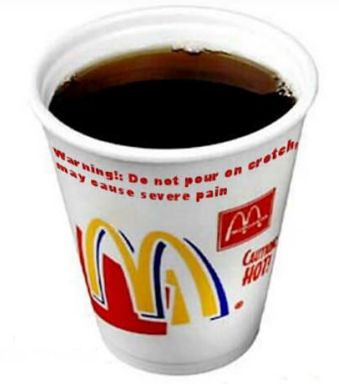 I had a very interesting conversation with Eric, a friend of mine who is lawyer. Someone was talking about the infamous trial in the US, where people sue a company for a yes or a no. For example, we can cite the famous Liebeck v. McDonald's Restaurants, where a jury awarded $2.9 million to a woman who burned herself with hot coffee. A lot of people are suing nowadays companies for a yes or a no, hoping for a large revenue out of it.
I had a very interesting conversation with Eric, a friend of mine who is lawyer. Someone was talking about the infamous trial in the US, where people sue a company for a yes or a no. For example, we can cite the famous Liebeck v. McDonald's Restaurants, where a jury awarded $2.9 million to a woman who burned herself with hot coffee. A lot of people are suing nowadays companies for a yes or a no, hoping for a large revenue out of it.As a European, this seems insane. How could this person not know her coffee was too hot? This is her fault, she should have seen it, or at least expecting it, from a warm beverage.
But Eric had a very interesting point of view. He says that as companies have failed to protect their customers of products defects, they had to find some ways to protect themselves, and that is the main purpose of law: to protect people. Therefore, customers started to attack companies who were lacking of communication about their products, or was not paying attention enough to their product qualities which could cause at some point some injuries. I found this interesting piece of evidences that McDonalds had some problems with its coffees prior to the trial.
Eric also said that in Europe, we have way much regulations, with a series of European Union and national tests and certification, which are supposed to make sure of the product safety. But even with all of these tests, we all know some products might have defects.
Companies are responsible of their product and services, and must make sure they are not dangerous for their users. Therefore, that results in a higher effort to communicate, to give all the information the customer need to assure its safety.
No comments:
Post a Comment